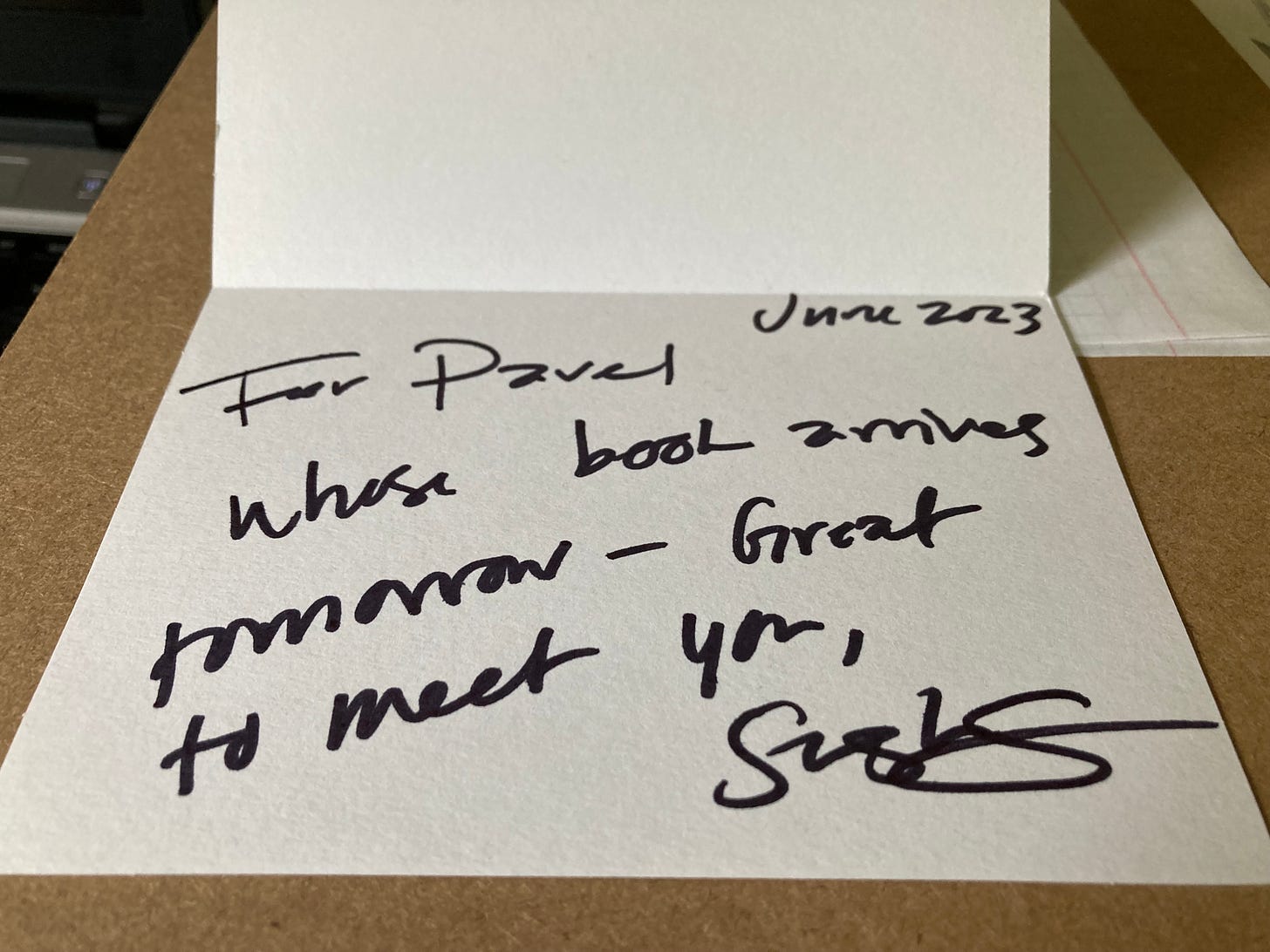meaning-making, rituals, giving/receiving dilemmas, and our purpose
Originally posted by Pavel S on his substack, On Humanity, on June 4 2023
Over the past few months, I’ve been journaling more frequently than usual, and yesterday’s group discussion with Sasha Sagan in Cambridge, MA inspired me to share some of my recent thoughts (and less-personal dilemmas) with all of you below. As always, your feedback and comments are warmly welcomed. Enjoy!
One of On Humanity’s aims is to magnify the roots of our discontents — our, both as individuals and as constituent members of society — earnestly and with care. It is to find our calling and strive to be authentic in who we really are as humans. It is to discover how we show up in various facets of our lives, including navigating our interpersonal connections and fulfilling our long-term goals.
We all come from unique seeds in a garden of assorted plants wild and domestic, some flourishing in the sun and some in the shade. We all host variously-sized worms, delightfully munching through our green (or yellow/orange/red) leaves and stems. Some of these worms stay on regardless of circumstances; others are ephemeral. (As long as we retain at least one leaf on each of our branches, there is no need for panic! I am only half-joking.) And just like plants, we all need water for our physical survival.
What is water in the garden of our intellectual desires and needs?
Before we tackle this question, let us turn to rituals and meaning.
Meaning-Making
Yesterday, I had the opportunity to attend a small-group, in-person salon, The Magic of the Everyday, hosted at MIT’s Media Lab1, for a conversation with Sasha Sagan, author of the book For Small Creatures Such as We: Rituals for Finding Meaning in Our Unlikely World and host of the Strange Customs podcast. Her work focuses on the search for meaning in and sustaining communal and personal bonds through rituals, particularly as viewed through a secular lens.
The conversation, as it often does in Interintellect salons, spanned the scope of entire conceptual categories. Facilitated by Thomas Arnold, it flowed through themes like marking the passage of time in different cultures, cherishing the significance of a journey, and the sacredness of home. (Home is a topic to explore in a future post and has sat in my drafts for months: please share with me your perceptions of what home means to you!)
Our pre-attendance homework was to think of and share a personal ritual we partake in. Mine was the ubiquitous Eastern European “sitting in silence before leaving” tradition, a custom every member of my extended family practices — no exception! — prior to any journey or an irregular trip, regardless of who at your residence is departing. (It serves as a moment to reflect on the road ahead and silently wish the departing party — or yourself! — a safe arrival at the destination.) Surprisingly, two participants were familiar with it, through cross-cultural ties.
Others shared common quirks like the universal knocking-on-wood; the one-fact about-yourself at group introductions; donations to organizations on life milestone occasions like birth, weddings, and death; the Western expectation of handwritten thank-you cards for guests at large celebrations; waiting a set time period for a celebration of life after one passes away; the transformation of Halloween into a “global masquerade party” and a chance for social norms to be broken within the law; not filling your own glass of wine at the table in some cultures; a Japanese practice of ‘work dinners’ (or enkai) reinvented on Zoom during the pandemic; and an old Japan-specific tradition of tearing down and rebuilding the Ise Grand Shrine every 20 years.
What rituals, dear reader, do you engage in? Please chime in!
Giving and Receiving
One theme brought up in the midst of the lively discussion and only briefly explored was one I wrestle with profoundly on a regular basis: the intricate balance between giving and receiving. While there was no time to share my experience with this issue at yesterday’s salon due to its complexity, I will attempt to touch on it in this post.

In life, we often take for granted our current state of affairs.
It is arguably not a stretch to say that at any given random moment, unless we are a philosopher by occupation or are otherwise preoccupied with existential questions more than 50% of our daylight hours, we are more likely to focus on reaching one of our goals than on pondering our past journey and visualizing in our imagination the people who contributed, perhaps even subconsciously, to our present level of being.
In other words, we take our past for granted more so than our future. We are willing to fight for our future, but we seldom truly stop to recognize the contributions of everyone who made a change in our past, especially if it was a change of perspective or a change in our mindsets. However small these changes may have seemed at the time, without them, our present — especially the hidden iceberg that is the human mind — could be radically different, i.e. the butterfly effect. And due to this gap of perception between the past and the future, we often have trouble either receiving gratitude from others (for our past actions that we feel do not warrant it) or giving sufficient weight to others’ actions for their effect on us, actions that may not have been directed at us but still ultimately made profound changes in our lives.
Here comes one of my relevant dilemmas, to be expounded below:
How do we properly value the totality of others’ contributions on us and our contributions on others, in practice? How do we practice gratitude mindfully yet exhaustively, while not exhausting the other party/parties with the discomfort they might feel in receiving such gratitude (whatever form it takes)?
Let me provide context for two kinds of cases I wrestle with in terms of this dilemma: elders and peers.
Case 1: Elders
Though I hold a physics, not a psychology degree, this substack-writing journey was in part inspired by my longstanding interest in human behavior. I’ve long been fascinated by the intricacies of human nature and the mechanisms by which people make decisions, even the smallest and, on the surface, inconsequential ones. As someone who grew up relatively introverted, it was in my character — through adolescence, at least — to observe an interaction between others from the sidelines at length, before taking part or joining it at all.
At an early age, sitting at a dinner table, I loved listening to my grandparents discuss subjects of cosmic importance, especially when initiated by my paternal grandmother, a lifelong, voracious reader and book lover, whose open-mindedness and a keen sense of people’s foibles stems from her thirty-five years of work as a high school teacher, before retiring. She has spent the next twenty-plus years as our family’s matriarch (at least informally so), and her life advice is invaluable. (I just had a Skype call with her shortly before writing this post.) Her early influence undoubtedly sparked my tendency to adopt a “bird’s-eye view” approach in any social setting, fostering deep curiosity about natural phenomena.
Many of you might relate to this case, where your role, years ago, had been that of a recipient of knowledge and experience from the elders, leading to this sub-dilemma:
How does one “value” such a foundation? How does one properly give back? What has your experience been like? And whereby your former teachers — not necessarily in the academic sense — are no longer alive, what do you do?
Case 2: Peers
There are people in everyone’s lives who act like magnets for one’s intellectual curiosity. Sometimes, these people leave a deep mark on one’s life in ways they (the people who left a mark) may not even be aware of. (In fact, it’s more likely than not that in each case of this type that I have in mind — there are at least several — they are unaware of the entire scope their non-directed actions have had on my life.)
At the same time, as one’s peers (give or take), they would undoubtedly feel uncomfortable receiving even a fraction of the level of gratitude they effectively deserve. Meanwhile, one may feel a level of guilt for not giving enough of this gratitude in the forms that one is able to, and more crucially, not knowing how to do so without disturbing their inner peace or, worse, emotionally overwhelming them.
Here comes one of my sub-dilemmas for case 2 that I’ll share:
A neutral substitute for giving back intangibles inevitably relies on materialism; therefore, it perpetuates our consumer-oriented lifestyle, whilst the goal is to thank someone for their immaterial good and influence and give back on an equivalent level with dignity. How and where do you draw boundaries between the material and immaterial types of giving or receiving? What has your experience been like?
I recall reading a few months ago this essay (by Isabel of the Mind Mine substack) on giving and receiving. The entire write-up is very much worth reading, esp. for those of us uneasy with the notion of receiving, myself included. Without spoiling the bulk of her message, here is part of Isabel’s conclusion:
“When we allow ourselves to receive gracefully, we feel more compelled to share. When are fully present and enjoy the acknowledgement of a gift, it fuels us with joy, positivity, enthusiasm, and confidence. The point of the gift is not the exchange itself but the feelings it offers. When we view receiving as an attack on our ego and a threat to our identity and independence, we lose the benefits of the gift. Opening ourselves up to receiving invites in the incredible emotions that come with gifts and wipes away the distracting, egoic feelings that keep us from accepting them.
The path to abundance is paved with receiving gracefully. When we learn to accept love from both ourselves and others, we accelerate our journey to becoming ourselves and sharing our gifts with the world.”
I couldn’t agree more. It is, then, a matter of turning theory into practice. If you would like to make use of the mutual support form in use since last year and ask for or offer help — either for yourself or for someone you know — the Giving posts will be shared in the Notes section on demand from now on.
Our Purpose
At the beginning of this essay, which I started this morning while skimming through my journal, I asked,
“What is water in the garden of our intellectual desires and needs?”
Let me try to answer it in the most straightforward way I can here.
Not knowing how to express gratitude properly in practice is only half the trouble, or much less. The other side of the coin is purpose.
When we wish to express gratitude to someone for something, what are we trying to achieve on a higher level if we aren’t sure a recipient would welcome it (or our version of idealism, of humanity, of the world in the first place)? Could it be our ego speaking?
To me, water, in the realm of our mind-gardens, is the care we express and the time we spend and the effort we put in to resolve an issue that bothers us or to give back to our sources of inspiration. Ideally, water flows toward our purpose, where water is the means and purpose is the end. Crucially, water is independent of the end it serves. In the realm of our life-gardens, we might encounter everyone ranging from the very hydrophilic tomato plants to the very water-resistant cacti. Some of us tend to be drawn to the latter yet have an abundant water supply we wish to give. This poses another dilemma.
The example above, where we continue to water plants potentially resistant to receiving it, means we begin to serve a purpose more aligned with our personal ego. That is not cool, as it reeks of exerting control over the rebel plant. Realigning our purpose, then, to a collective, shared purpose and watering more of the soil would take pressure off the rebel plant and instead allow all the other seeds to sprout and bloom.
(Calling a plant a rebel somehow compels me to share a link to this English version collab performance of the famous Italian resistance song here, one of my favorites!)
That is the framework I’ll leave you all with, as a starting point, for the time being, but you are, of course, welcome to take it further, elaborate, debate it, or perhaps, if you’d like, start building — and sprinkling water on — the garden of your life.
What is your life purpose?
“And all will pass by, by that good flower. And they’ll only see its bloom.” – Bella Ciao translation by Alderon Tyran ft. Janissa Lang [link]
If you need the help of others or know someone who does, please use the mutual support form as usual, or reach out directly. Please consider sharing with your friends, family, or neighbors!
If you’d like to feature your own work or thought process in this publication via a future Creative Humans email-interview, or you know someone who may, please reach out.
In addition, anyone is welcome to serve as a guest or as a host for the Anyhumans podcast. You may interview a friend or sign up yourself using Calendly for a convenient time. Be bold!
1 Thank you to Wes Chow for hosting us all at the C3 lab, and for the insightful conversations and tour afterward!
Cover photo: Center for Constructive Communication lab in MIT Media Lab building, where the discussion with Sasha Sagan took place yesterday. (Photo by Pavel S, June 3, 2023)

